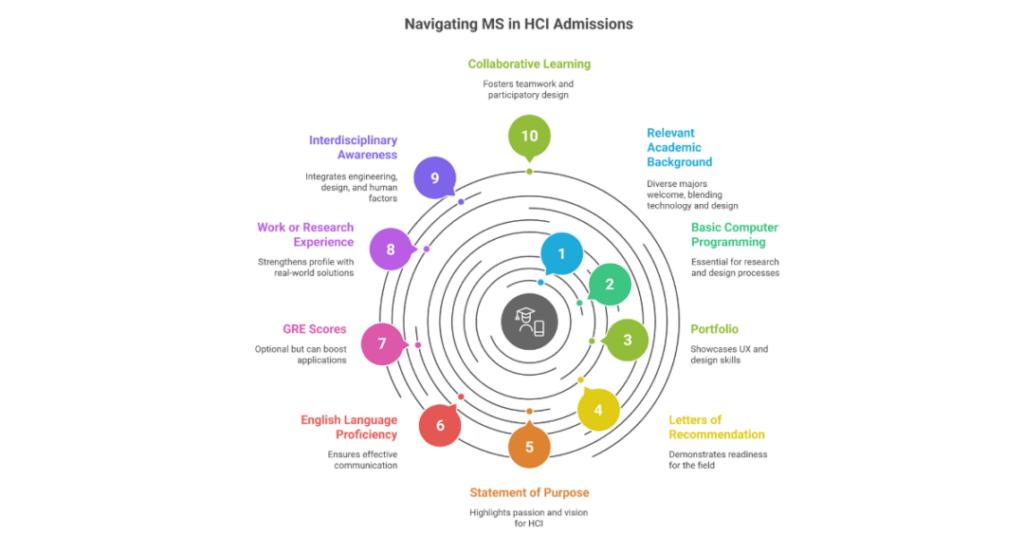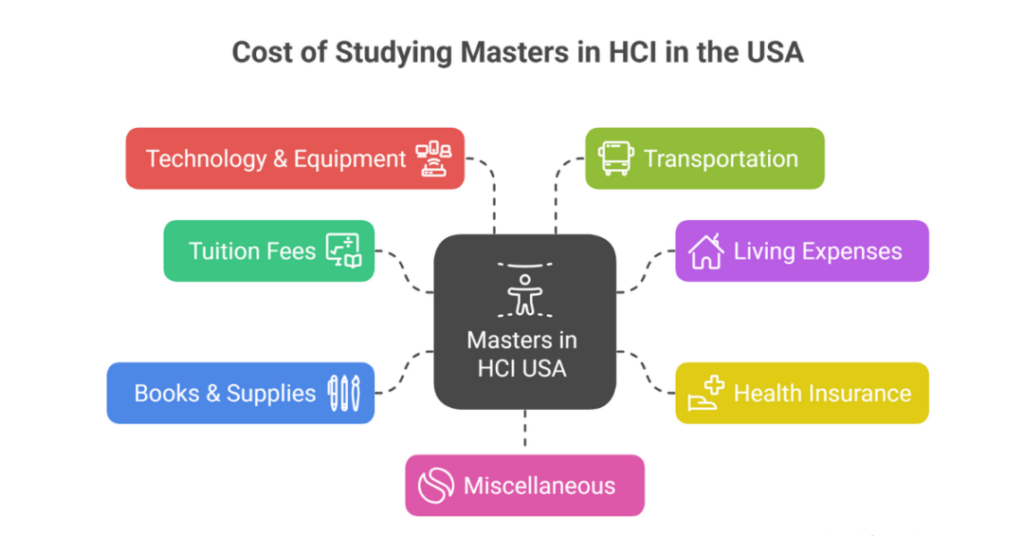14 August 2025
6 minutes read
Masters in HCI USA: A Complete Guide for Indian Students

Key Takeaways
- Masters in HCI USA – Offers high career growth, with global HCI and UX jobs projected to rise 20% by 2030.
- Strategic Preparation – Go beyond coding by building a strong portfolio, mastering user research, and securing scholarships.
- Global Opportunities – Opens doors to diverse roles creating human-centered solutions for industries worldwide.
“By 2030, UX and HCI jobs are projected to grow over 20% globally,” yet many Indian students eyeing a Masters in HCI USA face a harsh reality: complex admissions, high tuition fees, and intense competition at top universities.
Breaking into this interdisciplinary field that blends computer science, human-computer interaction, and user experience demands more than just basic computer programming or coding skills.
The solution? Strategic preparation, building a strong portfolio, acing user research methods, and leveraging scholarship opportunities to thrive post-graduation.
Why Pursue a Masters in HCI in the USA as an Indian Student?
Pursuing a Masters in HCI USA gives international students access to top universities offering interdisciplinary programs that blend computer science, interaction design, and human-centered design. A master of science in human-computer equips graduates with skills in user research, UX, user interface, software engineering, and data science.
With elective courses, capstone projects, and scholarships for international students, students prepare for roles designing the best possible interaction by users. This academic field, where humans and computers come together, offers career development in visual design, research methods, and qualitative or quantitative analysis, ensuring strong post-graduation prospects.
10 Top Universities Offering Masters in HCI in the USA for Indian Students
Earning a Masters in HCI USA opens doors to universities in the USA that are leaders in software engineering and computer science, information science, and user experience.
These programs, often housed in college of computing or integrated into more established disciplines, focus on how human beings interact with computers and prepare graduates with skills in research and design, HCI and UX, and human-centered approaches.
Below is a list of top universities that offer a Master of Human-Computer Interaction or Science in Human-Computer Interaction, ideal for international students from business to engineering backgrounds.
| University | Program Name | Key Features | Tuition Fee (Approx.) | Location |
|---|---|---|---|---|
| Carnegie Mellon University | Master of Human-Computer Interaction | HCI curriculum with studio courses, capstone projects, and participatory design | $58,000/year | Pittsburgh, PA |
| University of Washington | MS in Human Centered Design & Engineering | Research and design, qualitative and quantitative methods, user interface | $35,000/year | Seattle, WA |
| Georgia Institute of Technology | MS in Human-Computer Interaction | Interdisciplinary program in software engineering and computer science, information science | $31,000/year | Atlanta, GA |
| Indiana University Bloomington | MS in HCI/d | Design and human, user research, visual design, elective courses | $25,000/year | Bloomington, IN |
| University of Michigan | MS in Information – HCI Specialization | Integrated into more established disciplines, user experience, data science | $49,000/year | Ann Arbor, MI |
| University of California, Irvine | MS in HCI & Design | Research methods, user design, software engineering | $36,000/year | Irvine, CA |
| Cornell University | MPS in Information Science (HCI Focus) | Human-computer interaction, interface design, business to engineering applications | $56,000/year | Ithaca, NY |
| Stanford University | MS in Computer Science – HCI Track | Programs are housed in software engineering and computer science, research and design | $57,000/year | Stanford, CA |
| University of Maryland | MS in Human-Computer Interaction | Concerned with how human beings interact with computers, HCI and UX | $31,000/year | College Park, MD |
| Rochester Institute of Technology | MS in HCI | HCI curriculum, letters of recommendation, career development focus | $35,000/year | Rochester, NY |
Admission Requirements for MS in Human Computer Interaction in USA
Pursuing a Masters in HCI USA means meeting competitive admission requirements set by university departments and integrated schools that offer this interdisciplinary field.

These programs are primarily concerned with how human beings interact with computers and seek candidates who can thrive in an academic field – the space where humans and computers come together.
- Relevant Academic Background
Most masters in human computer interaction programs accept graduates from all kinds of majors, from computer scientists to experience designers. The discipline is concerned with blending technology and design, so applicants should be comfortable including layout and usability concepts. - Basic Computer Programming or Coding Knowledge
While intended for those with basic computer programming or coding knowledge, some universities also train beginners. Still, prior skills help coordinate these elements to allow for smoother research and design processes. - Portfolio Showcasing UX and Design Skills
Programs including user experience and interface design often require a portfolio. This shows your ability to work to coordinate these elements that together make up that interface for the best possible interaction by users. - Letters of Recommendation
Strong letters of recommendation from professors or employers demonstrate you’re ready for a rather new academic field that prepares students for diverse roles. These help admissions committees see your potential to make that process more seamless. - Statement of Purpose (SOP)
The Statement of Purpose (SOP) should highlight your passion for humans interact with technology, your vision for improving humanity through design, and your understanding of the elements that together make great interfaces. - English Language Proficiency
International students are usually required to take TOEFL or IELTS. This ensures you can engage fully in university departments and integrated settings and collaborate across kinds of majors. - GRE Scores (Optional in Many Schools)
Some universities in the USA still require GRE scores for master’s in human-computer interaction admission. High scores can boost applications, especially when competing for scholarships and financial aid. - Work or Research Experience
Having experience in HCI and UX, research and design, or as a role as creators in technology projects can strengthen your profile. Employers and faculty value applicants who’ve worked on elements that together make real-world solutions. - Awareness of the Field’s Interdisciplinary Nature
The academic field integrates software engineering and computer science with design and human factors. Being aware of how engineers who are primarily concerned with functionality and designers collaborate helps you succeed. - Readiness for Collaborative Learning
These programs are filled with graduates from diverse backgrounds, from business to engineering. Being open to participatory design and teamwork allows for the best possible outcomes in studio courses and capstone projects.
Cost of Studying Masters in Human-Computer Interaction in the USA for International Students
Pursuing a Masters in HCI USA can be a significant investment, as the total cost includes human-computer interaction program tuition, living expenses, and additional academic fees.

These programs are concerned with all the elements e.g, design, technology, and research, that shape future UX leaders, aligning with insights from the User Experience Professionals Association and according to the user experience standards.
| Expense Category | Description | Estimated Annual Cost (USD) |
|---|---|---|
| Tuition Fees | Covers instruction, labs, and resources for the masters in hci usa program that includes human-computer interaction coursework. | $25,000 – $60,000 |
| Living Expenses | Housing, utilities, food, and personal needs, varying by city and lifestyle. | $12,000 – $22,000 |
| Health Insurance | Mandatory coverage for international students, ensuring access to healthcare while studying. | $1,200 – $3,500 |
| Books & Supplies | Costs for textbooks, design software, and materials concerned with all the elements of HCI study. | $800 – $2,000 |
| Technology & Equipment | Laptops, peripherals, and tools required for e.g prototyping and user testing. | $1,000 – $2,500 |
| Transportation | Public transit passes or personal transport costs depending on location. | $800 – $2,000 |
| Miscellaneous | Student activity fees, networking events, and conferences recommended by the User Experience Professionals Association. | $500 – $1,500 |
Job Opportunities After Masters in HCI USA
Graduates of a Masters in HCI USA enter diverse roles such as UX Designer, Interaction Designer, User Researcher, and Product Manager. As an alumnus of top HCI programs, you’ll work in industries spanning tech, healthcare, finance, and education.
Employers value your ability to design intuitive interfaces, conduct qualitative and quantitative user research, and improve digital experiences. With skills in human-centered design, software tools, and usability testing, you can secure positions at leading companies, startups, or research labs worldwide.
Conclusion
A Masters in HCI USA is more than a degree; it’s your entry into a future where you shape how millions interact with technology. From crafting intuitive interfaces to leading UX innovations, this path blends creativity, research, and impact. But getting there takes more than just ambition; it takes the right guidance.
That’s where Ambitio comes in. As experts in study abroad consulting and profile building, we don’t just prepare applications; we build standout candidates. Ready to turn your dream into a global success story? Let’s craft your winning HCI journey. Connect with Ambitio today and make it happen.
FAQs
What qualifications do I need to apply for an MS in HCI in the USA?
Typically, applicants need a bachelor’s degree in computer science, design, psychology, or a related field. Some programs may require GRE scores, a portfolio, or relevant work experience.
Are there any scholarships available for HCI students in the USA?
Yes, many universities offer scholarships based on merit, research potential, or financial need. There are also external scholarships available from various organizations and foundations.
What career opportunities are available after completing an MS in HCI?
Graduates can pursue careers as UX Designers, Interaction Designers, User Researchers, and more, across various industries such as technology, healthcare, and finance.
How much does it cost to study HCI in the USA?
Tuition fees for MS in HCI programs vary, ranging from $20,000 to $50,000 per year, depending on the university and program. Additional costs for living expenses and materials should also be considered.
Is HCI a good field for international students in the USA?
Yes, HCI is an excellent field for international students, offering a diverse and innovative learning environment. However, students should be prepared for the challenges of cultural adaptation and visa requirements.
Can I pursue HCI if my bachelor’s degree is not in a related field?
Many HCI programs welcome students from diverse academic backgrounds. Some programs may require foundational courses or recommend gaining relevant experience before applying.
How important is a background in programming or design for applying to an HCI program?
While not always a strict requirement, a background in programming, design, or related fields can be beneficial. It helps in understanding the technical aspects of creating digital interfaces and enhances your ability to engage with the interdisciplinary nature of HCI studies.

You can study at top universities worldwide!
Get expert tips and tricks to get into top universities with a free expert session.
Book Your Free 30-Minute Session Now! Book a call now




























